FIV+ Educational Series
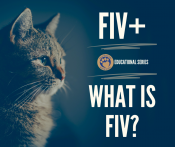
Feline Immunodeficiency Virus (FIV) is a prevalent and impactful infectious disease affecting cats worldwide. Similar to HIV in humans, FIV attacks a cat's immune system, making them vulnerable to various infections. While infected cats may seem healthy for years, they eventually develop immune deficiency, leaving them susceptible to severe illnesses caused by common bacteria, viruses, protozoa, and fungi.
Unlike some infections, FIV is primarily transmitted through deep bite wounds, typically occurring during aggressive fights, particularly among unneutered male cats that roam freely outdoors. Although it can also spread through sexual contact or from an infected mother to her kittens, these instances are rare.
It's important to note that FIV is specific to cats and cannot spread to other species, including humans.
Currently, there is no cure for FIV, and there is no vaccine available for protection in the U.S. Understanding the nature and transmission of FIV is crucial for providing appropriate care and support for our feline companions.
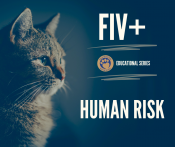
FIV and Human Health:
Feline Immunodeficiency Virus (FIV) may share similarities with Human Immunodeficiency Virus (HIV) and cause a feline disease akin to Acquired Immune Deficiency Syndrome (AIDS), but it's crucial to note: FIV is highly species-specific and infects only felines. There is no evidence that FIV can infect or cause disease in humans.
Species-Specific Viruses:
While HIV and FIV belong to the same virus family, they infect different species. HIV exclusively targets humans, and FIV exclusively targets cats. These viruses are incredibly specific to their respective species, eliminating any risk of cross-infection between the immunodeficiency viruses of cats and humans.
No Cross-Infection Risk:
Despite the similarities, there is zero risk of FIV transmission from cats to humans or vice versa. FIV is cat-specific, ensuring that the virus does not pose any health threat to humans.
Peace of Mind:
Pet owners can rest assured that while FIV requires responsible management for the well-being of our feline friends, it does not pose any health risk to the human members of our households. Understanding the species-specific nature of FIV is key to dispelling any concerns about cross-infection.
Let's spread accurate information and alleviate any worries about FIV in relation to human health!
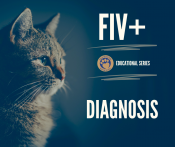
Importance of FIV Testing:
Determining the FIV status of your cats is crucial when they are first acquired, if they become ill, and regularly if there's any risk of exposure. The FIV diagnosis involves understanding the presence of antibodies against the virus in the cat's blood.
Blood Tests and Diagnostic Techniques:
1. ELISA Test: This common screening test detects FIV antibodies and can be performed in the veterinarian's office.
2. Confirmation Tests: Positive ELISA results may be confirmed using the Western blot or immunofluorescence (IFA) assays at a reference laboratory.
Challenges and Additional Testing:
Timing Matters: A negative antibody test doesn't immediately rule out infection, as it takes 2 to 6 months for antibodies to develop. Retesting after at least 60 days is recommended for a more accurate result if exposure is possible.
False Positives: Some cats may test negative in later FIV stages due to compromised immune systems. Kittens born to infected mothers may receive positive results due to transferred antibodies but may not be infected.
Kitten Testing: Kittens under six months born to infected mothers may test positive due to maternal antibodies. Retesting at 60-day intervals until six months helps clarify their infection status.
Vaccination History Matters: FIV vaccines can produce antibodies, leading to positive test results. Knowing the vaccination history is crucial, although there has been no commercially available FIV vaccine in North America since 2016.
PCR Test: While less preferred for screening, the Polymerase Chain Reaction (PCR) test detects viral DNA directly, providing an alternative for confirmation in some instances.
Confirmation and Retesting:
If a cat tests positive on ELISA, confirmation through retesting (after eight weeks for young kittens) or more definitive tests like Western blot or PCR is essential.
Ensuring Accuracy and Clarity:
Understanding the nuances of FIV testing helps ensure accurate results, guiding proper care and management for our feline friends. Regular testing is a responsible step in maintaining their health.
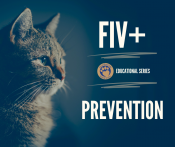
Preventing FIV in Cats: A Guide to Responsible Ownership
The Surefire Protection: The most effective way to safeguard your feline friend from Feline Immunodeficiency Virus (FIV) is to prevent their exposure to the virus. Cat bites are the primary means of transmission, so keeping cats indoors significantly reduces the risk of FIV infection from potentially infected cats that might bite them.
Household Measures:
1. Indoor Living: Ensure your cats live indoors, away from potential encounters with infected cats.
2. Screen Newcomers: When bringing new cats into a household with uninfected cats, confirm that they are free from FIV.
3. Separation when Needed: If possible, separate infected cats from non-infected ones within a household.
Testing and Separation: Unfortunately, FIV is often diagnosed in cats after living with others for years. In such cases, test all cats in the household. Ideally, separate infected cats from non-infected ones to eliminate the potential for FIV transmission.
Cleaning Practices: While FIV doesn't survive for more than a few hours in most environments, infected cats may carry other infectious agents. To minimize transmission risks:
1. Thoroughly clean and disinfect or replace food and water dishes, bedding, litter pans, and toys.
2. Use a dilute solution of household bleach (four ounces in 1 gallon of water) as an excellent disinfectant.
3. Vacuum carpets and mop floors with an appropriate cleanser.
Vaccination and Prudence: Before introducing new cats or kittens into a household, ensure they are properly vaccinated against other infectious agents. This adds an extra layer of protection against potential threats.
Responsible cat ownership includes taking proactive steps to prevent FIV and other diseases. Let's create safe and healthy environments for our feline companions!
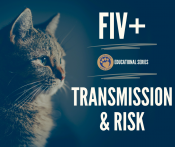
Understanding FIV Transmission and Risk
How is FIV transmitted?
The primary mode of Feline Immunodeficiency Virus (FIV) transmission is through bite wounds from an infected cat. Casual, non-aggressive contact, like sharing water bowls or mutual grooming, doesn't efficiently spread the virus. Households with stable social structures, where cats don't engage in aggressive fights, have little risk of FIV transmission. Rarely, an infected mother cat may pass the infection to her kittens, with increased risk if the mother contracts FIV during pregnancy. Sexual contact is not a significant means of spreading FIV among cats.
Prevalence and High-Risk Situations:
FIV-infected cats exist worldwide, with varying prevalence. In North America, about 2.5-5% of healthy cats carry FIV. Higher rates (15% or more) occur in sick or high-risk cats. Unneutered male cats with outdoor access, especially those prone to fighting, face the greatest risk. No vaccine is commercially available in North America, making it crucial to limit contact with potentially infected cats, keeping them indoors and testing all cats within the household.
Shedding the Virus:
Infected cats mainly shed the virus in their saliva. Transmission occurs when an actively shedding cat bites another, inoculating saliva through the wound. Susceptible cats may also become infected through other bodily fluids, especially infected blood, entering their bodies via bite wounds or blood transfusions. Sexual transmission is also possible.
Fighters and Bite Abscesses:
FIV-positive cats are often known fighters, especially those with a history of cat bite abscesses. Cats bitten by an unknown medical history cat should be tested for FIV approximately two months after the bite. The virus doesn't survive long outside living cells, making casual infection uncommon.
Living Together and Reducing Risks:
FIV-positive and -negative cats can coexist if spayed or neutered, kept indoors, and interact peacefully. The virus doesn't efficiently spread through shared household items or grooming. With indoor-only, fixed cats, the chances of aggressive interactions, especially with tooth penetration, are minimal. Properly introducing new cats into the household gradually helps reduce stress, particularly for immunocompromised cats.
Understanding FIV transmission and risks is essential for responsible cat ownership.
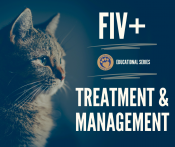
Managing FIV+ Cats: Promoting Health and Well-being
No Cure, but Hope for a Normal Life:
Currently, there's no definitive cure for Feline Immunodeficiency Virus (FIV). However, with proper management, cats infected with FIV can lead normal, healthy lives for many years. Vigilance becomes paramount, especially after severe illnesses or persistent signs like fever and weight loss.
Key Management Strategies:
Indoor Living: Keep FIV+ cats indoors and isolated from other cats to reduce the risk of secondary infections and prevent the spread of FIV. Spaying and neutering further eliminate transmission risks and reduce tendencies to roam and fight.
Balanced Nutrition: Feed a nutritionally complete and balanced diet, avoiding uncooked food and unpasteurized dairy products to minimize the risk of food-borne infections.
Regular Veterinary Visits: Schedule wellness visits every six months for detailed physical examinations, weight measurements, and necessary tests. Close monitoring is crucial as weight loss is often an early sign of deterioration.
Vigilant Monitoring: Due to reduced immune response, prompt evaluation and treatment are vital when signs of illness appear. FIV+ cats may require longer or more intense treatments than their non-infected counterparts.
FIV and Consequences:
FIV weakens the immune system, leading to prolonged or chronic infections. Common signs, collectively referred to as feline AIDS, include gingivitis/stomatitis, weight loss, poor appetite, fever, chronic conjunctivitis, swollen lymph nodes, vomiting, and diarrhea. While these signs are non-specific, persistent or recurrent illness warrants FIV testing.
Regular Exams and Prompt Vet Visits: FIV-positive cats benefit from exams at least twice a year, especially older cats or those with chronic medical conditions. Watch for symptoms like sneezing, unusual urination, poor coat condition, lack of appetite, gum inflammation, and diarrhea. Prompt vet visits are crucial in such cases.
Indoor Living for FIV+ Cats: Keep them indoors to protect other cats and shield them from infectious diseases. Ensure their environment is stimulating to prevent stress-related health issues.
Compassionate Care for FIV+ Cats: While there's no cure, responsible management and regular vet visits can help FIV+ cats live fulfilling lives.
